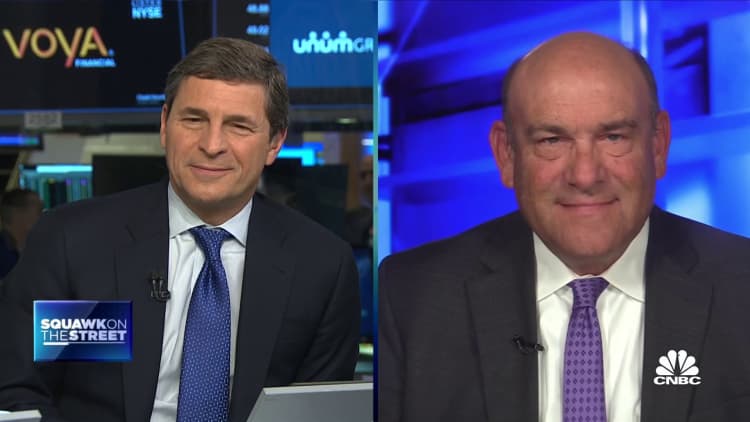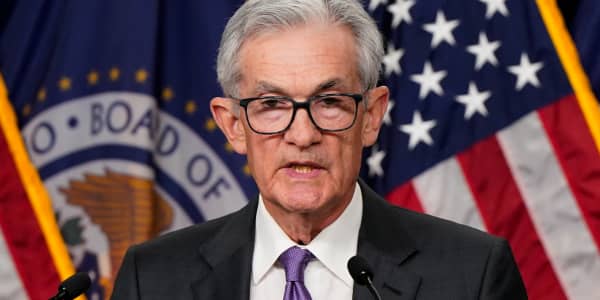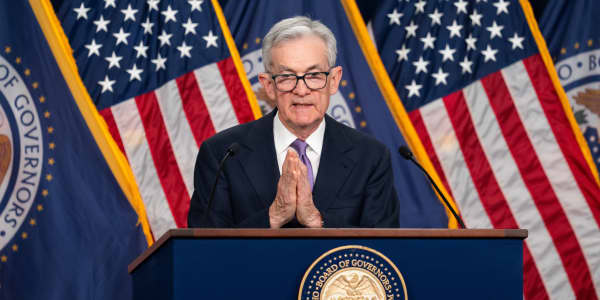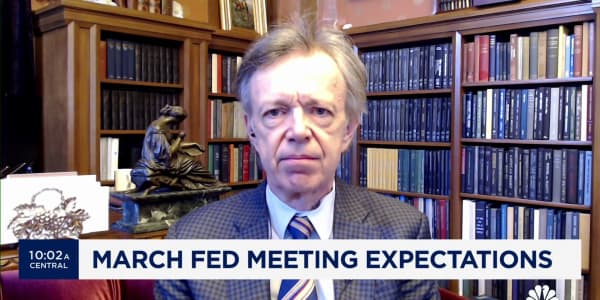
While respondents to the CNBC Fed Survey expect no additional rate hikes from the Federal Reserve, they have fully embraced its "higher-for-longer" mantra to the point where no rate cuts are expected until the third quarter of 2024.
The 31 respondents, including economists, strategists and analysts, believe the Fed is now on hold into September of next year, when 57% expect a rate cut. As recently as the summer, respondents had forecast rate cuts in the beginning of next year.
"I believe (Fed Chair Jerome) Powell & Co. can now be patient, sit back and see how all the tightening that has already taken place on the short end and recently on the long end plays out," Peter Boockvar, chief investment officer for Bleakley Financial Group, wrote in response to the survey. "And it will play out as higher rates continue to squeeze more and more households."
The change can also be seen in the outlook for the fed funds rate, the central bank's benchmark for short-term lending costs.
It's now forecast on average to end 2024 at 4.6%, assuming about 75 basis points of rate cuts. In June, the year-end 2024 funds rate was forecast at 3.8%, which assumed 125 basis points of cuts. A basis point equals 0.01%.
The outlook for a more hawkish Fed comes with roughly equal probabilities for a recession and a soft landing.
Respondents on average see a 49% probability of a recession in the next 12 months and a 42% probability of a soft landing. While they have driven up their 2023 GDP forecast from under 1% in June to 2.4% now, they have slashed the outlook for growth roughly in half for 2024 to 0.73%.
"The Fed is too focused on a soft landing and has relegated hitting its target on inflation to a distant 'eventually,'" wrote Robert Brusca, chief economist at Fact and Opinion Economics. He calls for the Fed to push harder now to bring down inflation and boost unemployment.
The consumer price index, currently running at 3.7% year over year, is seen declining to 2.9% next year and around 2.6% in 2025, which is to say the Fed will not hits its 2% target for several years, even accounting for the CPI running above the Fed's preferred personal consumption expenditures price index inflation indicator.
Some 60% of respondents see the Fed hitting its inflation target in 2025 or sometime after that, and 19% don't believe the Fed will ever get there. The unemployment rate is forecast to go up from the current level of 3.8% to 4.5% next year.
Troy Ludtka, senior U.S. economist at SMBC Nikko Securities Americas, said high Treasury yields and rising global tensions "raise the probability of a stagflationary outcome. … We are paying close attention to the recent rise in credit card and auto loan delinquencies. In these areas, consumers appear to be overextended."
But some are more upbeat.
Mark Zandi, chief economist at Moody's Analytics, asks, "What recession? The economy continues to show extraordinary resilience. Consumers are doing their part, businesses are hanging tough and the infrastructure and CHIPS Act are providing a tailwind."
At the same time, high bond yields and growing deficits have emerged as areas of concern: 77% say a 10-year yield at 5% will make the Fed less likely to hike rates, 87% say high rates are having a "somewhat negative impact" on business hiring and spending and 73% say high rates have a somewhat negative effect on consumer spending.
All respondents say they are concerned about the growth rate of the federal deficit, and 87% are concerned about the size of the debt.
But respondents differ on how to address the problem.
A plurality of 45% say the government should both raise revenue and cut spending, while 42% advocate only spending cuts. Respondents place a 39% probability on a government shutdown, with 61% saying it will be "somewhat negative" for the economy.
Don't miss these CNBC PRO stories:
- Want to retire in 5 years? Here's how to invest for it, according to the pros
- Morgan Stanley says the average stock is breaking down, S&P 500 to fall to 3,900 by year-end
- This highly profitable industry is booming as the population ages
- This chip stock is getting a ton of love from Wall Street, and it's not Nvidia





